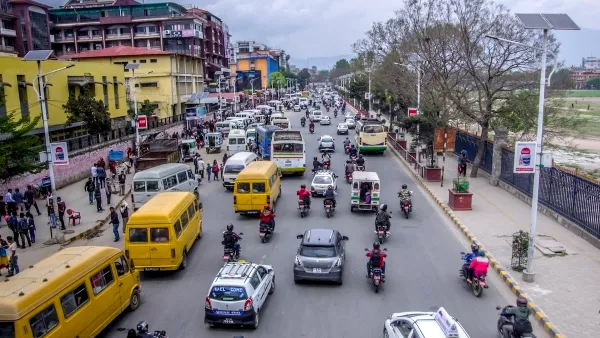The ecosystems of Oregon’s Coast Range are some of the most adept ecosystems for absorbing carbon in the entire country. The same trees that absorb that carbon can be turned into a major source of emissions in the hands of humans.

Carl Segerstrom reports on a surprising environmental dynamic at work in Oregon, revealed by a recent study authored by researchers at Oregon State University and the University of Idaho.
Less than a year after devastating fires ripped through some of the most beautiful areas in the state, a study published by the Proceedings of the National Academy of Sciences of the United States of America (PNAS) finds that logging and wood products are a larger source of carbon emissions in Oregon's forests than fires.
"Figuring out the role of forests and wood in carbon pollution could have major policy implications in Oregon, as Gov. Kate Brown has pledged to meet the emissions goals of the Paris Climate accords," according to Segerstrom.
Not only are fires a smaller source of carbon emissions, but "the wood products industry is the largest sector contributing to carbon pollution in the state," according to the study, as explained by Segerstrom.
"Wood product emissions are the result of fuel burned by logging equipment, the hauling of timber, milling, wood burned during forestry activities, and the ongoing decomposition of trees after they are cut," explains Segerstrom.
The researchers responsible for the study will next expand the concept to a larger swath of the Western United States.
FULL STORY: Timber is Oregon’s biggest carbon polluter

Maui's Vacation Rental Debate Turns Ugly
Verbal attacks, misinformation campaigns and fistfights plague a high-stakes debate to convert thousands of vacation rentals into long-term housing.

Planetizen Federal Action Tracker
A weekly monitor of how Trump’s orders and actions are impacting planners and planning in America.

In Urban Planning, AI Prompting Could be the New Design Thinking
Creativity has long been key to great urban design. What if we see AI as our new creative partner?

Portland Raises Parking Fees to Pay for Street Maintenance
The city is struggling to bridge a massive budget gap at the Bureau of Transportation, which largely depleted its reserves during the Civd-19 pandemic.

Spokane Mayor Introduces Housing Reforms Package
Mayor Lisa Brown’s proposals include deferring or waiving some development fees to encourage more affordable housing development.

Houston Mayor Kills Another Bike Lane
The mayor rejected a proposed bike lane in the Montrose district in keeping with his pledge to maintain car lanes.
Urban Design for Planners 1: Software Tools
This six-course series explores essential urban design concepts using open source software and equips planners with the tools they need to participate fully in the urban design process.
Planning for Universal Design
Learn the tools for implementing Universal Design in planning regulations.
Gallatin County Department of Planning & Community Development
Heyer Gruel & Associates PA
JM Goldson LLC
City of Camden Redevelopment Agency
City of Astoria
Transportation Research & Education Center (TREC) at Portland State University
Jefferson Parish Government
Camden Redevelopment Agency
City of Claremont





























